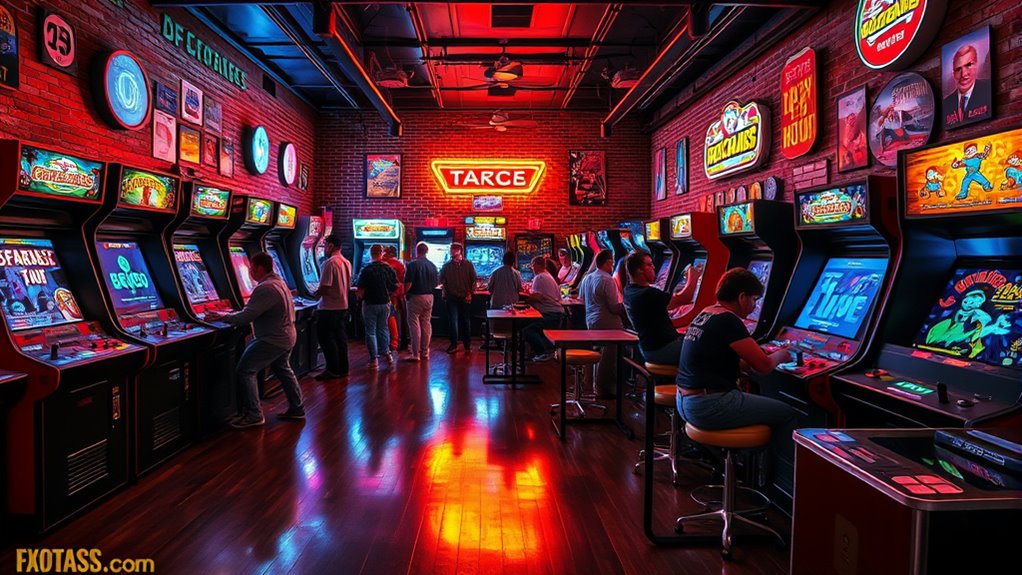The history of video games begins in the 1950s-60s with simple experiments like “Tennis for Two” and “Spacewar!” that laid the groundwork for future innovations. As technology advanced, arcade games and home consoles like Atari’s 2600 made gaming popular worldwide. Today, we see immersive experiences with VR, online multiplayer, and AI-powered features shaping gaming culture. To discover how these changes reflect society and future trends, you’ll want to explore more.
Key Takeaways
- Video games originated in the 1950s-60s with experimental, non-commercial projects like “OXO” and “Spacewar!” influencing future development.
- The rise of arcade machines and consoles like Atari’s 2600 popularized social gaming and embedded gaming into mainstream culture.
- Technological advances from 2D to 3D graphics, online multiplayer, and mobile gaming shaped industry growth and gameplay diversity.
- Modern innovations such as virtual reality, AI, and cloud gaming deepen immersion and expand accessibility in gaming experiences.
- Video games significantly impact entertainment, social interactions, e-sports, and cultural trends, influencing fashion, education, and societal norms.
Early Foundations and Pioneering Games
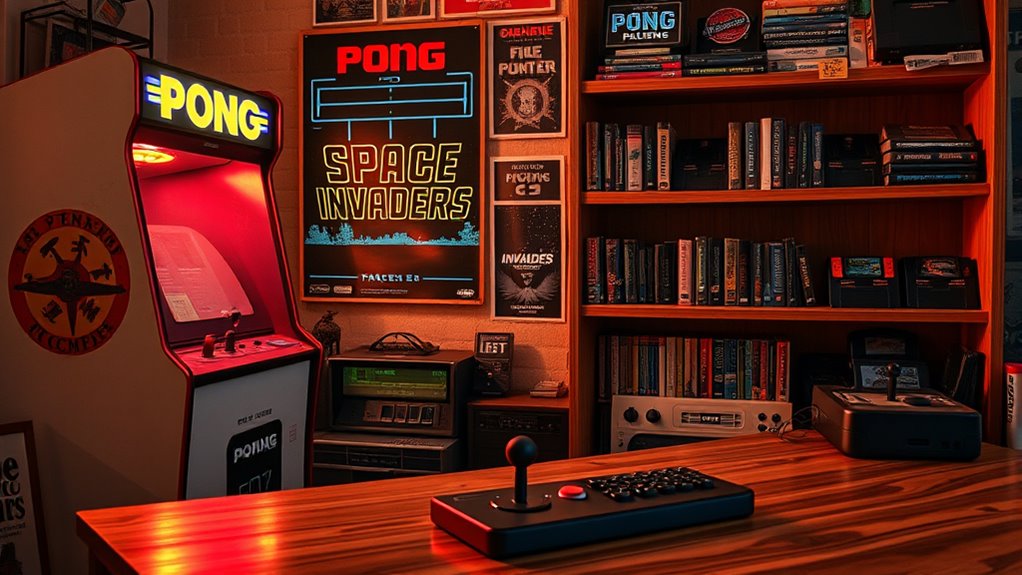
The roots of video games trace back to the 1950s and 1960s, when computer scientists created simple games and simulations on minicomputers and mainframes. You might not realize, but some of the earliest experiments, like “OXO” in 1952 and “Tennis for Two” in 1958, weren’t commercial products but pioneering efforts to explore interactive entertainment. In 1962, “Spacewar!” emerged as a groundbreaking game, spreading across universities and inspiring future developers. Even earlier, the “Nim” game was showcased at the 1940 World’s Fair, demonstrating that people had a fascination with game logic and competition long before home consoles. Ralph Baer’s 1967 “Brown Box” laid the groundwork for home gaming, hinting at the industry’s future potential. Additionally, these early innovations helped establish the foundations of in-home entertainment that would evolve into the modern gaming industry.
The Rise of Consoles and Arcade Culture

As home gaming technology advanced, consoles and arcade machines became central to the gaming revolution. You could now play video games in arcades, where machines like “PONG” and “Space Invaders” drew crowds and sparked a social scene. The release of the Magnavox Odyssey in 1972 introduced the first home console, making gaming accessible outside arcades. This shift fueled a craze for arcade cabinets and home systems, with Atari’s 2600 popularizing cartridge-based games. Arcades became bustling hubs of entertainment, attracting diverse players. You experienced communal excitement and friendly competition. The rise of consoles like the Atari 2600 and arcade hits like “Pac-Man” transformed gaming from niche hobby to mainstream culture, laying the foundation for today’s global gaming industry. Video game history also highlights how technological innovations contributed to the growth and cultural significance of gaming.
Evolution of Gaming Technology and Industry Dynamics
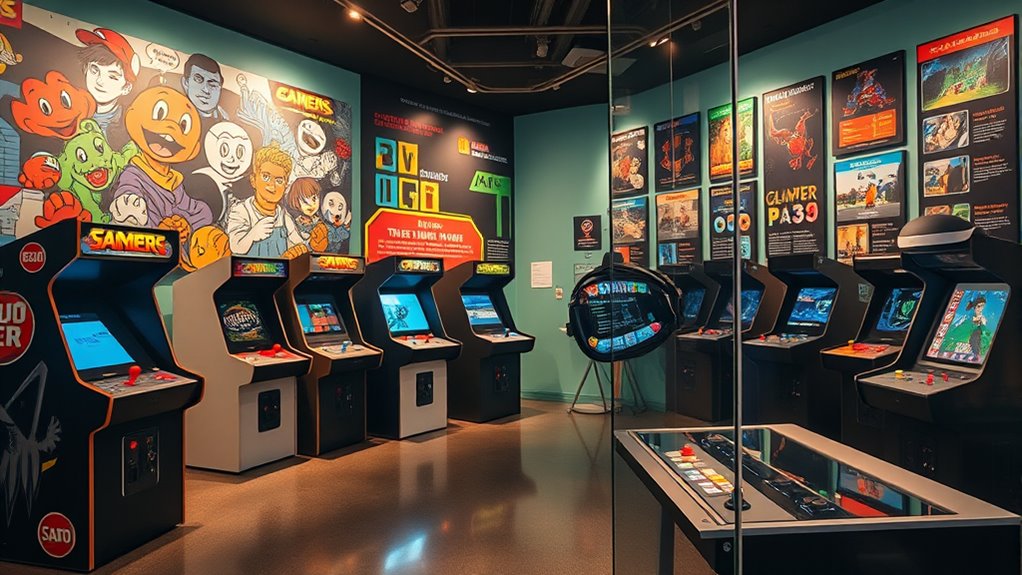
Advancements in gaming technology have continuously reshaped the industry, driving innovation and expanding what’s possible in gameplay. You’ve seen how early experiments with simple computers evolved into sophisticated consoles and powerful PCs. The industry’s dynamics shifted with the rise of third-party developers, creating a broader variety of games and genres. The progression from 2D to 3D graphics in the 1990s revolutionized visual storytelling and immersion. Online connectivity transformed multiplayer experiences and fostered global communities. Mobile gaming and cloud technology introduced new platforms, making gaming more accessible. Meanwhile, hardware advancements like VR and AI promise immersive experiences and smarter NPCs. These technological evolutions have driven industry growth, competition, and diversification, shaping gaming into a multifaceted entertainment powerhouse. Access to resources and tools, such as resources and tools, can further support innovation and development within the industry.
Modern Trends and Technological Innovations
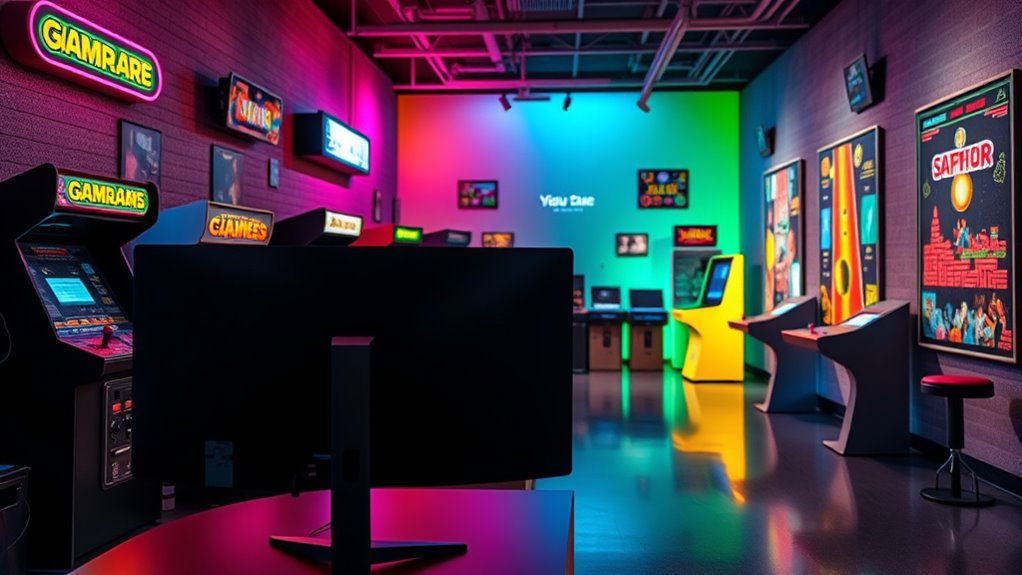
Recent innovations in gaming technology continue to reshape how you experience interactive entertainment. Virtual reality immerses you in new worlds, while AI enhances NPC behavior, making gameplay more dynamic. Cloud gaming lets you stream titles across devices without downloads, increasing accessibility. You can now enjoy real-time multiplayer competitions and social interactions seamlessly. These advancements push boundaries, creating more engaging and personalized experiences. Additionally, ethical considerations surrounding these innovations are becoming increasingly important as developers seek to balance immersive gameplay with responsible technology use.
Cultural Impact and Future Perspectives
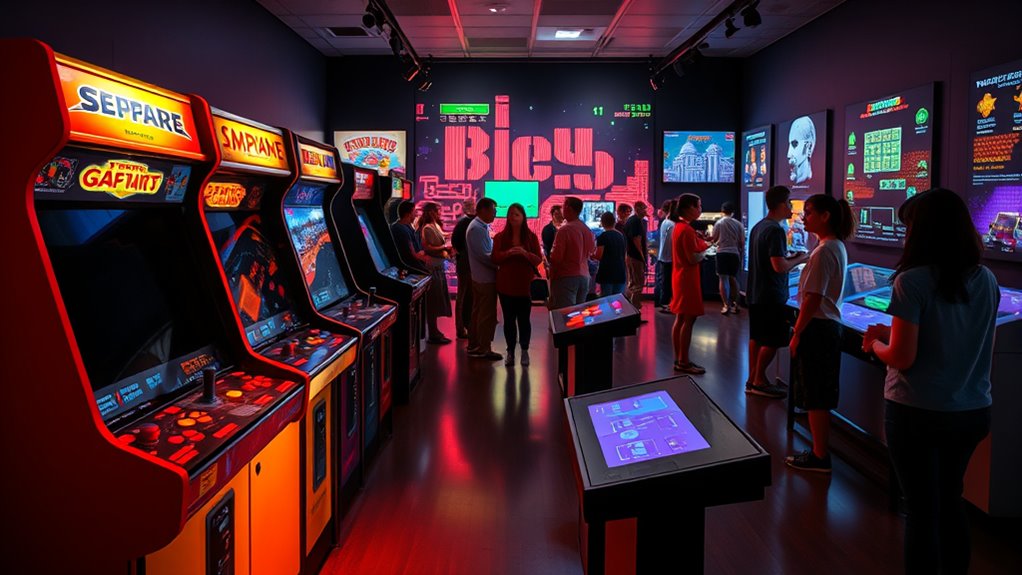
Have you ever wondered how video games have become a powerful force shaping modern culture? Today, gaming influences entertainment, fashion, social interactions, and even education. You see it in e-sports tournaments drawing massive audiences and players connecting globally through online communities. Video games challenge perceptions, spark creativity, and foster teamwork. As technology advances with VR, AI, and cloud gaming, these experiences will become even more immersive and accessible. You’ll likely witness games becoming more integrated into everyday life, blurring lines between reality and virtual worlds. The industry’s growth promises new cultural trends, including innovative storytelling, diverse representation, and social activism within games. Moving forward, gaming will continue to redefine entertainment, influence societal norms, and shape how you learn, connect, and play. Additionally, the development of high refresh rates and low input lag in projectors and screens will further enhance the gaming experience, making it more seamless and engaging.
Frequently Asked Questions
How Did Early Computer Games Influence Modern Gaming Genres?
Early computer games laid the foundation for modern gaming genres by introducing core concepts like interactivity, scoring, and gameplay mechanics. You can see their influence in today’s action, puzzle, and simulation games, which build on these basic ideas. These pioneers showed you how to create engaging experiences, inspiring developers to innovate and expand genres, leading to the diverse and immersive gaming landscape you enjoy now.
What Role Did Independent Developers Play in Gaming History?
You might not realize it, but independent developers played a pivotal role in shaping gaming history. They often stumbled upon innovative ideas by accident, like creating unique gameplay or storytelling techniques that big studios overlooked. Their passion and experimentation led to groundbreaking titles and fresh genres, pushing the industry forward. Without these independent pioneers, gaming wouldn’t have the diversity, creativity, and innovation that define it today.
How Have Gaming Communities Shaped Industry Evolution?
You influence gaming communities by sharing your experiences and creating connections that drive industry change. When you participate in forums, stream gameplay, or collaborate on projects, you shape trends and demand new features. Your feedback helps developers improve games, while your enthusiasm fosters growth. As a gamer, your voice and engagement directly impact industry evolution, encouraging innovation, inclusivity, and community-driven content that keeps the industry dynamic and responsive to player needs.
What Legal Issues Have Impacted Video Game Development?
You’ve seen legal issues like copyright disputes, which can delay or block game releases, and concerns over content regulation that lead to age ratings and censorship. Intellectual property rights influence how developers create and share games, while lawsuits over patent infringements can cost millions. Additionally, privacy laws affect online features, and antitrust cases shape industry competition. These legal challenges directly impact game development, distribution, and innovation.
How Do Cultural Differences Influence Game Design Worldwide?
You’ll find that cultural differences shape game design worldwide by influencing themes, characters, and gameplay mechanics. You need to take into account local customs, values, and social norms to create engaging experiences that resonate with diverse audiences. Incorporating cultural symbols or avoiding sensitive topics helps you avoid alienating players. By adapting content to different cultures, you ensure your game appeals broadly, fostering acceptance and success in global markets.
Conclusion
As you explore the history and culture of video games, you’ll realize you’re witnessing a revolution that changed the world more profoundly than any other entertainment form. From humble beginnings to mind-blowing innovations, gaming continues to shape our society and imagination. Embrace this incredible journey, because what’s next might just redefine reality itself. The future of gaming isn’t just bright — it’s dazzling enough to blind the universe with its brilliance!

